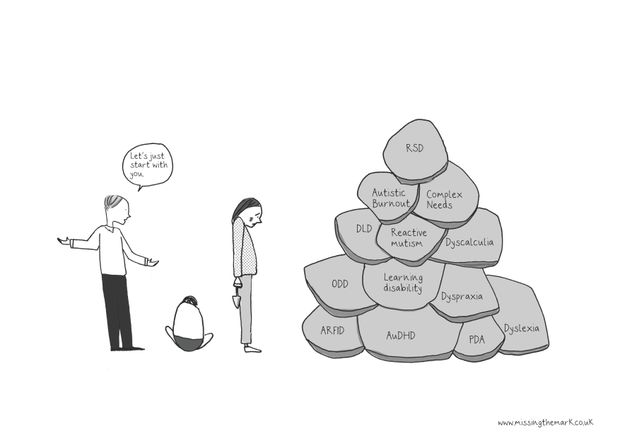


Do they have autistic burnout or is it depression? AuDHD or just autism? Is their silence reactive or selective mutism? Is the reason they are so upset rejection sensitivity dysphoria? Who really knows?
Feeling anxious yet?
I talk to many parents who are desperately worried that they’re failing their child. They are concerned that they haven’t got the right diagnosis and that means that no one will understand. They think this means they’ll get the wrong support. They are overwhelmed and the more they read, the worse it gets.
There are too many people who will tell you that getting the ‘right’ diagnosis is essential. That without it, things will get worse. I’ve read people saying that if a professional thinks that your child is depressed, but actually they are burn out, then they’ll get the ‘wrong treatment’. Or if you think they are selectively mute, but actually it’s reactive, then you risk disaster.
They argue that these distinctions are crucially important. I disagree. Here’s why.
The first thing is that many of those new ‘diagnoses’ aren’t formal diagnoses at all. They aren’t in the diagnostic manuals. That’s why many psychologists won’t give you a diagnosis of “RSD” or “autistic burnout” or even “PDA”. They aren’t invalidating your struggles. They’re saying, those aren’t official terms.
What are they then? They started as experiences that people have given a name to. They are descriptions. Sometimes by professionals, sometimes by those with lived experience. They’ve started to write about these experiences (or make Insta reels about), and the ideas have spread across the internet. Others recognise the symptoms and join in. They popularise it.
As they do, people start to develop specialisms. They create training programmes for this new descriptions, and tell people that it’s essential to identify it correctly. Some of these people write books and create communities.
But there’s a catch.
No one has shown that the terms ‘RSD’ or ‘autistic burnout’ or ‘after school restraint collapse’ (or many others) refer to something truly new or distinctive. No one has shown that assigning the new label means that outcomes will be better. No one has shown that we need to further divide up the categories that we have already. For if we need more, then why stop with (for example) ‘autistic burnout’? Why not ADHD burnout. Dyslexic burnout. Anxious burnout. OCD burnout, Dyspraxic burnout…. Each would and could be different. I can imagine the reels now. There would be lots to say.
But the point is, diversity of experience doesn’t mean that we need more categories. Each person’s experience of burnout is already unique and needs to be understood in itself. It never implied that everyone had the same experience. It’s a description, not an explanation.
Then it gets even more complicated. Even with official diagnoses (like ADHD, or autism), research shows that they aren’t clearly distinct from each other. The boundaries are fuzzy. Humans don’t fall into neat boxes. A diagnosis is useful for getting help, but it doesn’t mean we understand how your brain works, nor that your brain is the same as others with the same diagnosis.
And here’s the most important thing. Psychologists and psychotherapists should never take a diagnosis and decide on an intervention without asking questions. We can’t determine what might help a person based on a diagnosis. Even less so, a diagnosis which isn’t actually a diagnosis. It means too many different things.
We know that boundaries are fuzzy and that a diagnosis means different things for different people. We know that the diagnosis a person comes with is much less important than getting to know them for themselves. We know that labels are unreliable and variable. We know that if you’ve met one autistic person, you’ve met one autistic person.
I’m not saying that lots of children don’t need help. I’m not saying that their struggles aren’t real. But sometimes the cacophony of proliferating labels can prevent us from looking at what really matters. We think that each new label is The Answer. We grasp hold of it in hope, until it turns out that things are just the same, just with a new name.
So what might help?
We have to meet our children where they are, discover what is going on for them, and see if we can find a way forward. No matter how many diagnoses they have. No matter if they are autistic, or ADHD, or demand avoidant, or anxious. We have to start with curiosity about them as a unique individual, and start with what matters (and what happened) to them.
There will always be new labels. But when it comes to each child, those labels aren’t the most important thing and they can become a distraction.
Understanding the individual comes first, second and last.
There are no short cuts.
With